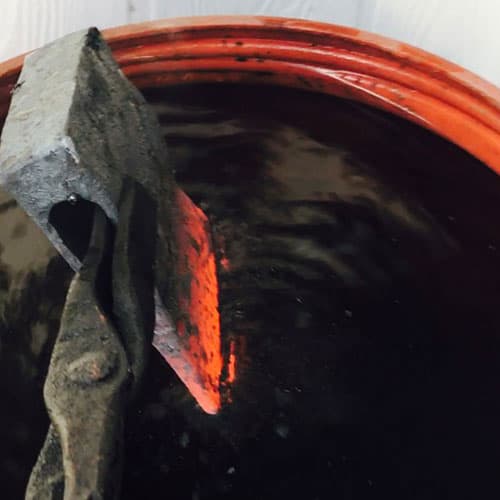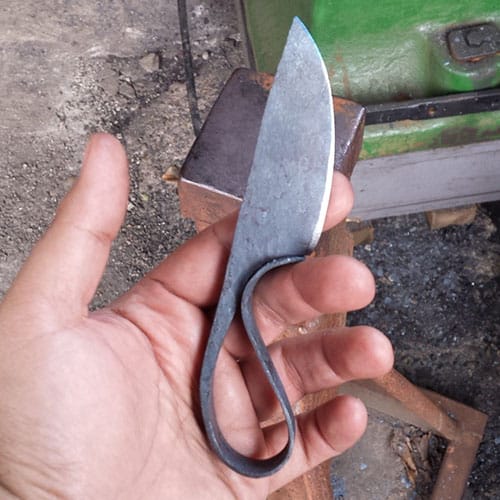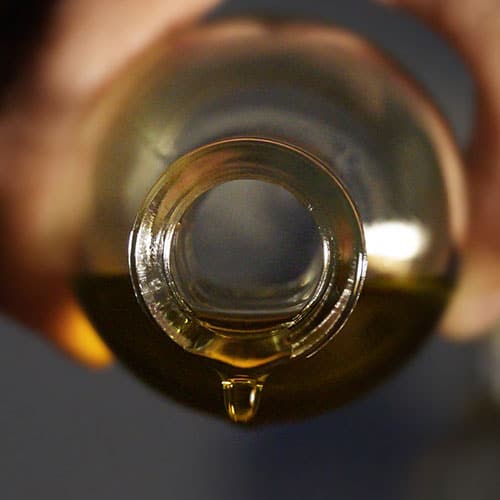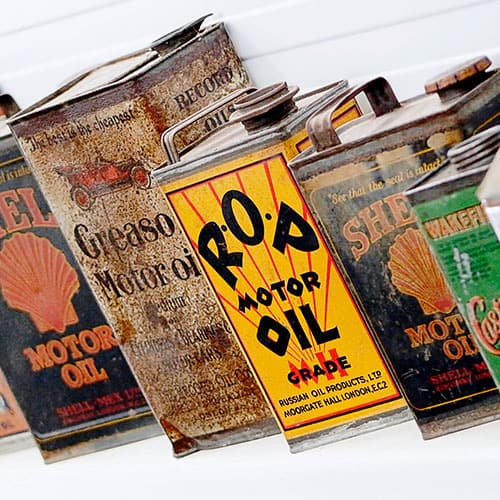what oil is used to quench a blade
Unlike Types of Quenching Oils for Blacksmithing 2022 (Compared)

The quenching process is a very important step in the blacksmithing procedure when working with heated metals. Quenching is a form of rapidly cooling a uniformly heated metal to limit and control the consequence that slow cooling has on a metal'southward microstructure and, therefore, its metallurgical properties.
One of the common media in which a blacksmithed workpiece can be quenched is oil. There are many kinds of quenching oils available to perform this task, but some may be better than others for certain applications.
The common quenching oils that we volition discuss are motor oils, food-grade oils, mineral oils and automatic manual fluids, and commercial quenching oils. Although the properties of these oils can vary profoundly, it is also important to consider their cost, availability, and compatibility with the class and type steel you intend to quench.
Sale

Park's AAA Quench Oil - ane Gallon Jug
- Appearance: Light Amber Oil, Viscosity @ 100°F: 14.0 – 19.3 cSt
- Nickel Ball Time: 9 – 11 seconds, Flash Point: > 340°F
- Parks AAA is considered a medium to medium fast oil. Many times a quench oil is described in seconds...
How Practise Oils Piece of work to Quench Metals?
The quenching process is made upward of different steps. When a heated workpiece first comes into contact with the quenching oil, a vapor layer forms around the metal every bit it is completely submerged. This vapor layer is stabilized by dissimilar weather.
The properties of the metal and those of the quenching oil can profoundly affect the stability of the vapor blanket surrounding the workpiece. One time the vapor blanket is destabilized, nucleate boiling takes place. This step in the process features the almost rapid rate of heat transfer. The molecular composition of the individual quenching oil plays a big office in determining when this step takes place and how fast information technology is.
Once the process temperature decreases below the oil'southward boiling point, the procedure transitions to the convective cooling footstep. The cooling rate in this pace is heavily dependent on the viscosity of the quench oil, which, in turn, is dependent on its purity. Below is a great video showcasing the quenching process in 2 different media, both oil and h2o:
As previously mentioned, the properties of quenching oils can vary greatly based on the type of oil being used. This variation affects the way in which the oil quenches a metal. Some of the furnishings information technology can crusade are manifested as structural changes to the piece of work metallic that are more than favorable at lower temperatures, like phase transformations.
Phase transformations could increase the density of a metal's crystal lattice, causing it to harden. The hardness of a metallic can decide how pliable or breakable it is, making this an of import feature to be able to command.
Is There Really a Best Quenching Oil?

While at that place may not be an overall all-time quenching oil blazon, there are quenching oils that may be meliorate-suited for quenching certain types or grades of steels in a particular application than others. This factor is very important to consider once y'all understand the characteristics of the metallic you intend to quench.
Since the weather of the quenching process are not universal to all metal types, information technology makes sense that the oils used for quenching are called based on the backdrop unique to the particular steel or steel alloy being quenched.
Steels and alloys undergo quenching at different starting temperatures and cooling rates to promote the uniformity and quality of the finished production. One of the common metallic and oil combinations are mineral oils and oil-hardened steels, considering it acts as an intermediate-rate quenchant.
Considerations When Buying Quenching Oils
i) Oil Quenching Costs

The cistron at the forefront of many blacksmiths' minds when choosing a quenching oil, is its cost. This is a very important and valid factor to consider, considering cost tin be affected past the effectiveness of a item oil in an application or only by the availability of the oil.
If you are a beginner blacksmith who would merely like to get started with some projects involving the quenching process in oil, it may exist more prudent for you to kickoff using cheaper oils to exercise and refine your technique.
If you are an advanced blacksmith trying to find the perfect quenching oil for your application, regardless of the cost, it would make more than sense to pick the ideal oil blazon for your project – often in the form of commercial quench oils.
2) Oil Quench Rate and Speed

The other concrete properties of quenching oil can also have a significant effect on how efficient it is at quenching a detail steel type. Some metals require certain quenching speeds to foreclose any cracking or distortion in its structure.
As briefly discussed, the viscosity of oil can advance or decelerate convective estrus transfer step in the quenching process, also referred to every bit the quench rate. The lower the viscosity of a detail oil, the faster the rate of heat transfer is. It is also of import to note that the viscosity can also be afflicted by the deposition of the oil that takes place equally it is used in the quenching process. This degradation is characterized by the presence of oxidation past-products in the oil, which tin also cause an increase to the overall fluid'south viscosity and lower the rate of heat transfer.
Another physical property that tin impact the quench rate is the water content of the oil. This belongings as well affects the look and quality of the finished workpiece if information technology does not cause a burn down in combination with the oil. Since h2o has very different properties from oil, more than two percent of the water content in a quenching oil could create irregularities on the surface of the workpiece and a dangerous combination. This is a form of contagion that tin can greatly alter the charge per unit of heat transfer on different parts of the metal'south surface due to thermal gradients.
three) Ecology Impact of Oils

The environmental impact that a quenching oil has is a very important factor to consider when choosing a quenching oil. This factor not only impacts the style in which you dispose of the oil, but the corporeality of times that you can re-use a quenching oil and get the most out of your supplies.
For example, premium quenching oils can last years earlier needing to dispose of them. In large-scale settings, oil filtration and circulation systems are currently used to optimize the use of quench oil due to the increasing costs of oil and its proper disposal. The recyclability of quench oils tin can subtract your carbon footprint. Some oils tin even be reclaimed as bio-fuels, further optimizing their apply.
Dissimilar Types of Blacksmith Quenching Oils (Comparing)
1) Motor Oils
Motor oils are a common blazon of quenching oil used in both blacksmithing and bladesmithing applications. New and used motor oils tin be used for quenching and are both widely available. New motor oil is typically cheaper to apply than commercial quenching oils.
Used motor oil is often free or easy to obtain, but it can comprise a few contaminants from being used in a vehicle. Unfortunately, both new and used motor oil have additives that can release toxins when the hot metal workpiece comes into contact with the oil during the quenching process. These toxins typically give off an undesirable odour during quenching. It is always wise to avoid inhaling these toxins and to vesture the proper safety gear for your awarding.
Quenching with motor oil should exist done in a space with enough ventilation. Due to the contaminants found in motor oils, a lot of blacksmiths who use it, observe that there is a thin night movie on their finished workpiece after quenching.
| Advantages | Disadvantages |
|
|
ii) Food-Form Oils
There are many food-grade quenching oil options bachelor to use for blacksmithing. Among these options are vegetable, peanut, and avocado oil. Some commonly used vegetable oils are canola, olive, and palm kernel oil. Vegetable oil is very cheap and comes from renewable sources. They are biodegradable and can even be reclaimed as bio fuels. Vegetable oils have ameliorate impact energy values when used as a quenching oil. This feature allows them to increase the toughness of the workpiece.
The trade-off with these oil types is the decreased hardness. Peanut oil and olive oil could besides be used for similar applications, simply they are typically more expensive than common neutral oils.
| Advantages | Disadvantages |
|
|
3) Mineral Oils & Automatic Transmission Fluids
Mineral oils and automated manual fluids are a suitable culling for motor oils. These types of oils actually exercise not comprise the additives that motor quenching oils are infamously known for in blacksmithing. If you practise non have admission to mineral oils, baby oil is another bully alternative for them, it simply contains an added scent.
Mineral oil quenchants work corking with steels that require a fast quench charge per unit and oil-hardened steels. Mineral oils more often than not have greater cooling capacities for steel alloys. Their efficiency in the quenching process increases their overall cost.
The ecology bear upon of mineral oils is not very skilful, as they are not biodegradable. If these oils are heated to very high temperatures, in that location is a possibility that unsafe aromatics volition start to build upwards and release toxins into the air.
| A dvantages | Disadvantages |
|
|
4) Commercial Quenching Oils
Sale

Park's AAA Quench Oil - one Gallon Jug
- Appearance: Light Amber Oil, Viscosity @ 100°F: fourteen.0 – 19.3 cSt
- Nickel Ball Time: ix – 11 seconds, Flash Point: > 340°F
- Parks AAA is considered a medium to medium fast oil. Many times a quench oil is described in seconds...
Commercial quenching oils are specifically made to be used in the quenching process, every bit their name suggests. There are a broad multifariousness of commercial quenching oils available to suit the different types of steels and steel alloys to exist quenched. They are composed in such a mode that dissimilar commercial quenching oils feature properties that tin can cause boring or fast quenching rates.
Since commercial quenching oils are made for the purpose of quenching, they are typically the most expensive quenching oil type bachelor. They are not hands accessible at general stores and have higher costs than common oils.
| Advantages | Disadvantages |
|
|
scottdoccujjoinds.blogspot.com
Source: https://workingtheflame.com/quenching-oils-for-blacksmithing/#:~:text=There%20are%20many%20food%2Dgrade,and%20comes%20from%20renewable%20sources.
0 Response to "what oil is used to quench a blade"
Post a Comment